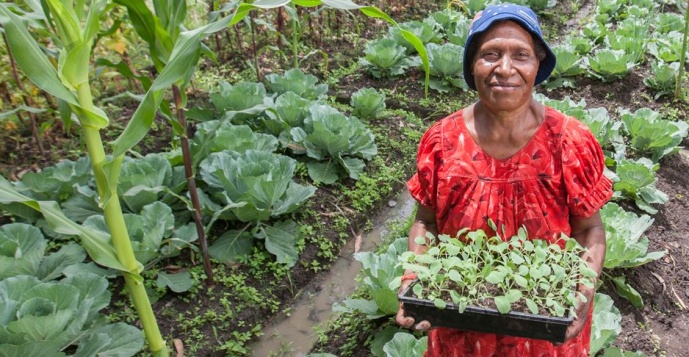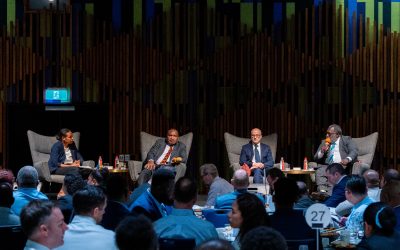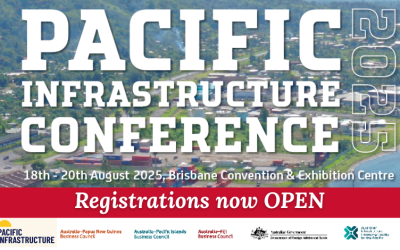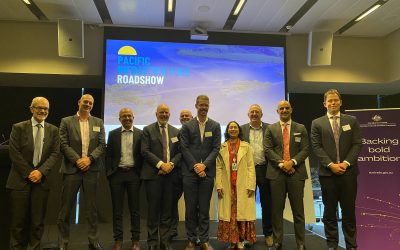Keynote address delivered by the Hon. Rimbink Pato OBE, LLB, MP at the 34th Australia Papua New Guinea Business Forum.
Speech.
Speaker: The Hon. Rimbink Pato OBE, LLB, MP
2 May 2018
{Salutation to those present}
It is a great pleasure to address you at this Forum in this historic year for Papua New Guinea.
It is a year which will see our country’s amazing potential displayed before the world at the APEC meetings, and in particular at the time of the leaders’ summit in November.
You here at this Forum know about our strategic location but there are many in the world who have yet to hear about us.
This APEC year is the perfect time for our international envoys to broadcast to the world that we are blessed to live in a position of great importance, that we are at the centre of a region of unparalled dynamism and economic energy.
Consider this: We are the next-door-neighbour to three powerhouses.
Our western neighbour is our friend, Republic of Indonesia, the nation with the fourth biggest population in the world.
To our south, our neighbours are the highly developed economies of Australasia.
To our east, our neighbours are the islands states of the Blue Pacific, who with us inhabit what many call a great ocean “continent”.
But there is lots more to come.
The path north leads to our close friend, the energetic nation of Japan and also to the resource-rich eastern regions of the Russian Federation, in the same breath, I mention South Korea, the Philippines, Malaysia, and Singapore –as well as other APEC economies.
And to our northwest, and not so far away, is the great country with the miracle economy of our time, the People’s Republic of China.
Informing the nations of the world of our location – that we are smack in the middle of the action– is just one half of the message we are delivering.
The other is that that Papua New Guinea is a treasure house of humanity — and that treasure house is open for business.
Just look at our physical treasures:
Our lush rain forests; our vast fisheries; our gold and copper, oil and gas; our top-quality coffee and cocoa; our fertile agricultural lands; our towering, cloud-piercing mountains: our islands embraced with coral of unimaginable colours.
No wonder our national bird is called a “bird of paradise’—because when that beautiful creature shimmers and flutters it is dancing in a natural God-given paradise.
And then there is the human wealth: There are about 8 million of us. By far the biggest population of any Pacific Island nation. We speak many languages, more than 800 of them —
the most of any nation on earth– and there are 1000 tribes that make up the country.
We were among the first farmers in the world, we possess cultures of flamboyant and fantastic artistry, our drums and flutes inspire us to dance at every opportunity we find.
Our people, as you will have experienced, extend the warmest of welcomes, and they demonstrate the strengths of resilience and spirituality.
Ours is a population with a great capacity for growth and for making a contribution to the world.
But we must be realistic. Many of our people are only on the first rung of the ladder of prosperity.
To help them climb further up that ladder, we need to have the resources, the funds, to develop our country, to further educate our people, women and men, in trades, agriculture, science, tourism, business and administration.
We know we have the talent, but we need to provide our youngsters, girls and boys, with as many opportunities as possible
The funds necessary will come from expansion of our international trade, investment and the general development of our domestic economy.
It is with this vision and aim– shared by my colleagues in Government—that I address you today on the topic of how our foreign policy benefits trade.
The first responsibility of a Foreign Affairs policy is to ensure the security and protection of the nation.
This is a task the Prime Minister, the Rt. Hon. Peter O’Neill, and our Government as a whole, take extremely seriously.
Our very name, the Independent State of Papua New Guinea, speaks of our fundamental aim—to be independent.
To be independent requires us to be secure. To be secure in this global world means we cannot go it alone.
We need as many friends as possible.
Underpinning our efforts in foreign affairs is firstly the policy of “connectivity” for security, stability and prosperity, and so we aim at establishing relationships with as many countries around the world as possible.
And secondly, we abide by the longstanding PNG foreign policy of: “Friends to all, enemies of none’.
If our region is not free from conflict and tension, our trading opportunities will be compromised.
So, we work very hard on connectivity. A major outcome of that policy was the decision to host APEC, a mighty undertaking for a country like PNG. And by that decision we have
clearly demonstrated how our foreign policy of connectivity benefits trade.
Just consider the benefits we are witnessing right now as the gaze of the nations of the Asia- Pacific rim are turning towards us, as their helping hands stretch out in friendship.
Look at some examples of nations who are spending millions upon millions of dollars to assist us in hosting this event: Australia, Canada, Indonesia, Japan, New Zealand the People’s Republic of China, Singapore, South Korea, and the United States of America.
Other examples of how we implement our connectivity principle are not hard to find.
We are active in our region and internationally. For example, we are prominent members of the Pacific Island Forum, the Melanesian Spearhead group, the African, Caribbean and
Pacific Group of States, the Commonwealth.
Through our special associate membership of ASEAN and the AEAN Regional Forum we are in close contact with our Southeast Asian neighbours –and –through the Cotonou agreement — with the European Union. We have very good relations with Russia. We are active at the United Nations, the WTO and in other international arenas.
We encourage nations from outside our region to assist us by playing appropriate roles to keep the Pacific peaceful and to promote its prosperity.
Our longstanding and permanent allies Australia, New Zealand and the United States of America, have done — and are doing — an excellent job in that respect.
And we welcome the generous assistance of our relatively new development partner, the People’s Republic of China to help our progress to prosperity.
Naturally, we encourage our friend China to play an appropriate role in ensuring peace and security in our region.
As I said recently in speech I delivered in Wellington, Papua New Guinea is a strong advocate of a rules-based international order, one founded on fair trading rules, and justice for all
members of the one human family.
We do not believe that either international anarchy or domination by powerful or authoritarian actors is good for anybody anywhere, or for the planet as whole.
We are not naïve about this. We recognise there are challenges to our global worldview.
By emphasising the fact that inclusiveness and independence can co-exist, we are confident that — despite setbacks – we can live in a region—and a world—that maintains the rules- based order I referred to.
I would like to give you more practical examples of how our foreign policy benefits trade.
I have just returned from the United Kingdom where at the Commonwealth Heads of Government meeting, Prime Minister O’Neill and I worked hard to deepen our connections with our Commonwealth cousins, most of whom are outside the APEC region. We want our trading networks to spread worldwide.
And with Brexit moving towards becoming reality, we engaged in productive discussions about it with the United Kingdom.
We were particularly happy when the Rt. Hon. Boris Johnson MP, the British Secretary of State, announced that the United Kingdom will open new High Commissions in the Pacific, in Vanuatu, Samoa and Tonga.
This will undoubtedly boost trade and also enhance security.
The Right Honourable Boris Johnson has accepted my invitation to visit Papua New Guinea, a token of our thanks for his warm hospitality at CHOGM and also as a signal of our willingness to boost our relationship with the United Kingdom and the Commonwealth in general. The dates are not yet settled but we expect it will be soon.
I expressed the willingness of Papua New Guinea to enter into a Free Trade Agreement with the United Kingdom.
Just before I attended CHOGM, I had the pleasure of meeting for the second time in five months with the Foreign Minister of the People’s Republic of China, my friend and counterpart His Excellency Wang Yi.
In Beijing we discussed in a most cordial atmosphere not only trade, investment and development arrangements but also our longstanding commitment to the One China policy.
We are looking forward to the historic time for us, a time when China will honour us with the presence of President Xi Jinping. We will extend our warmest hospitality and highest honour to the esteemed President.
As an outcome of the discussions last month in the capital of China, feasibility studies will be soon undertaken to determine a possible Free Trade Agreement with the People’s Republic of China.
Another recent visit was to New Zealand, where I had productive discussions — firstly with PNG-NZ Business Council in Auckland;
And then in Wellington with my counterpart as Foreign Minister, the Deputy Prime Minister, the Right Hon. Winston Peters, and his foreign affairs and trade colleague Under-Secretary Fletcher Tabuteau MP, and the Defence Minister, the Hon. Ron Mark.
Let me make mention of a further momentous event ahead.
We will welcome to our shores at the time of APEC leaders’ meeting, the President of the United States of America, His Excellency Donald Trump
President Trump’s agreement to attend is a great honour for Papua New Guinea.
We will treat that visit accordingly and show him the traditional warm hospitality for which our people are renowned.
We hope that –out of our close relationship with the President and our longstanding friendship with his country — our multi-level relationship will deepen further.
At the World Trade Organisation ministerial meeting in Buenos Aires, when the United States was fielding some criticism, I expressed our friendship with the USA and pointed out that we in Papua New Guinea support bilateral agreements which are in harmony with WTO rules.
Let me move directly to the topic of trade and investment with Australia, the key interest of this forum.
Might I recognise at this point the presence of my distinguished colleague, Commerce and Industry Minister The Honourable Wera Mori, MP who is with us at this Forum, and whose work is closely associated with trade. Minister Mori will implement the agreements reached overseas. We work together and very closely as he implements all decisions on trade and investments on the domestic front.
As most of you will know, I co-chaired with my much-respected counterpart and dear friend, Foreign Minister the Honourable Julie Bishop the annual Papua New Guinea- Australia ministerial forum last month here in Brisbane.
Trade was a focal point but not the only aspect of our discussions.
For example, I found it useful to have bilateral talks with Home Affairs Minister the Honourable Peter Dutton and to join in discussions at the Forum with Defence Minister Hon. Marise Payne, and the Minister for International Development and the Pacific, Senator the Hon. Concetta Fierravanti-Wells.
At the Forum, not only did Australia reinforce its support for our efforts to host APEC — including but not only with the security arrangements — but we had an excellent discussion with business leaders from both countries about impediments to investment and trade and the need to remove them.
My “can-do” colleague, Lands and Physical Planning, and APEC Minister Honourable Justin Tkatchenko MP assured the business representatives that he would bring those matters to the urgent attention of the Cabinet and the Government as a whole. The Minister has my fullest support.
It is in meetings such as that one — and indeed at this Forum we are attending today — that we can hear expert advice from those involved as to what they think will help boost trade and investment in Papua New Guinea.
Let us review the facts and figures:
As we all know, Australian companies have already invested some $18 billion in Papua New Guinea. About 4,600 Australian firms do business in our country.
The value of our exports to Australia total some $4 billion, and we receive just over half that value in terms of imports from Australia.
We welcome the new consulate in Lae because both countries are focused on developing trade and investment in provinces other than the regions near Port Moresby.
Those investment, trade and other business connections have their roots in a long history of friendship between the two countries, one supported by family, church, sporting, academic and business links down the generations.
We welcome the extractive industries, which are set to help bring the prosperity to our nation.
I endorse the Prime Minister’s stated determination to properly develop our international trade.
As the Prime Minister has pointed out, although foreign investment in resource projects offers clear potential for growth, it is also essential is that we fashion a more diverse economy that is also focused on agriculture, fisheries, services and tourism, as well as better governance.
That way, Papua New Guinea will convert our national endowments into sustained, broad- based economic growth.
The swift decision of both Australia and Papua New Guinea to establish the high-speed communications cable will assist with connectivity to a degree we can hardly imagine at the moment and of the immense benefits it will bring.
We look forward to your increasing involvement with Papua New Guinea and hope that together we achieve the goals of prosperity for you as business enterprises engaged with our country, and also — and vitally — for our people as a whole. Please let us know if we can assist you.
To ensure a good trading and investment environment, we have to continually work on upskilling our public service and workforce, to remove capacity constraints.
We welcome Australia’s contribution in this area, reinforced by Minister Julie Bishop in March when she opened new buildings in the re-named Pacific Leadership and Governance Precinct in Port Moresby.
I would also like to take this opportunity to thank the Government and people of Australia for their extremely quick, generous and effective help to us after the recent earthquake tragedy. I would also like to thank the Australian business sector operating in PNG and also other businesses for their very generous assistance at that time and in the ongoing recovery work.
In conclusion, our goal is to guide Papua New Guinea towards an internationally competitive export-driven economy that is built on –and aided by — an expanding and efficient domestic market.
We hope you will all continue to be closely involved in this.
This year is a special year, the year of APEC, a year when our foreign policy and our trade and investment policy and all the hard work of those organising the event will bear fruit— and leave an ongoing legacy to the APEC process for Papua New Guinea.
It will be a time to deepen existing relationships — and to make new ones — as the attention of the other APEC nations and the rest of the world is focussed on our beautiful country and her people.
–END–



